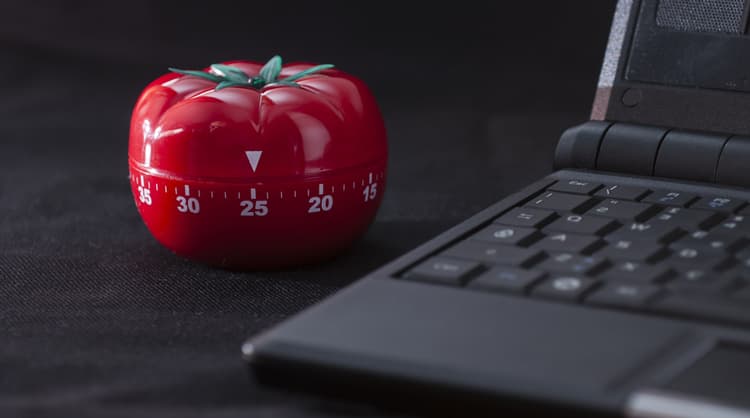How to stop procrastinating and keep studying

Procrastination is something many of us struggle with, especially when it comes to work and study.
Even if you’re not a serial procrastinator, chances are there are things in your life that you prefer to put off until later. While this is completely normal, it can certainly be frustrating when you know you should be studying—you may even want to study—but your lack of motivation is holding you back.
The most common piece of advice when it comes to procrastinating is to “just bite the bullet and do it” and although this is true, it’s a lot easier said than done!
Here are some simple tips to help you avoid procrastinating and stay on track with your studies.
6 tips to avoid procrastination when studying
- Consider the source of your procrastination.
- Associate studying with positive experiences.
- Work smarter, not harder.
- Focus on one thing at a time.
- Limit distractions during your study time.
- Practice self-compassion.
1. Consider the source of your procrastination.
Often, we procrastinate because we want to avoid an unpleasant or overwhelming task.
What makes a task unpleasant? Perhaps you are studying for a subject that you’re having difficulty with, so the most convenient course of action is to avoid it completely. Or you may be dreading taking the exam, because past experience tells you exams are stressful. These are emotional responses that create unpleasant feelings we’d do anything to avoid.
According to Canadian Psychology Professor Dr. Timothy Pychyl, emotional regulation is the key to overcoming the habit of procrastination. In other words, if you’re a chronic procrastinator your mood may be solely responsible for the delay in your actions.
One study that appears to support this idea, asked two groups of students to attend a lab session and complete a math puzzle at the end. One group was told the puzzle was an important test of their skill and ability, while the other group was told it was a meaningless and fun game. Before starting the puzzle, the students were given some time to prepare for the test.
The students who were chronic procrastinators only delayed preparing for the task when it was described as a test of their abilities. When it was described as a game, they behaved the same as the non-procrastinators.
This experiment suggests that if your mood is ‘fixed’ at positive or neutral you are far less likely to procrastinate, but if you expect your mood to change for the worse you’re more likely to avoid whatever it is that’s going to put you in a bad mood.
This can be helpful to know, since most of the time we procrastinate tasks we deem to be unpleasant, when ultimately changing our perception can make a world of difference to how we approach them.
2. Associate studying with positive experiences.
So, how do you change your perception? If you’re someone who doesn’t like the idea of studying (even if you enjoy the subject) having a study routine can make the act of studying a more positive experience.
For example, you can start your study session with a cup of tea or coffee and your favourite healthy snack, or by listening to soothing instrumental music while you study to motivate you as you work. Studying in a peaceful environment as opposed to one that is chaotic and messy can also help.
In short, surround yourself with things that make you happy and calm so that you approach your studies in the same way.
3. Work smarter, not harder.

Remember, the most important thing is to get started, even if you can only manage five minutes. It’s easy to underestimate what you can get done in five minutes, but once you make a commitment to work for five minutes, you’re far more likely to keep going.
4. Focus on one thing at a time.
When asked about what tips they have for beating procrastination, some successful CEO’s prefer to set reasonable expectations for the day ahead. They prioritise what is most important and create a to-do list that only includes a few must-do items. If you’re trying to fit in your studies around other commitments, see if you can shift things around in your schedule.
If you have an overflowing list of things to do, it’s easy to put your studies on the backburner. Ask yourself— is there anything you can take off your to-do list? It is far less overwhelming to focus on one thing at a time. By letting some things go, you can focus on one important goal for the day ahead.
5. Limit distractions during your study time.

If you struggle with distractions, you can try the Pomodoro Technique where you set a timer and work in blocks of time, allowing yourself frequent breaks.
6. Practice self-compassion.
While procrastinating can feel good in the moment, once the relief of avoidance wears off the guilt sets in and the cycle continues. Procrastination is a habit that reinforces feelings of guilt and resistance—we feel we are not good enough if we cannot achieve what we promised ourselves. In an ideal world, everything would get done when we intend it to be done. But the reality is that life can get in the way, and sometimes we have bad days.
It’s important to remember that each day is an opportunity to improve ourselves and work on our habits. Feeling guilty, talking down to yourself and calling yourself “lazy” doesn’t help and only makes you feel worse in the end. Instead, allow yourself the space to recoup and then take small, manageable steps to get into a study routine that works for you.
Need help getting on the right foot?
Everyone procrastinates to some degree, but it can be easily managed by creating positive study habits. From how to stay focused on your goals to improving your time management, SkillsTalk offers a wealth of information for students who want to stay on track and reach their goals. If you’re looking for advice on what to study, be sure to check out our other articles on SkillsTalk or chat to one of our education consultants for more information.


)
)

